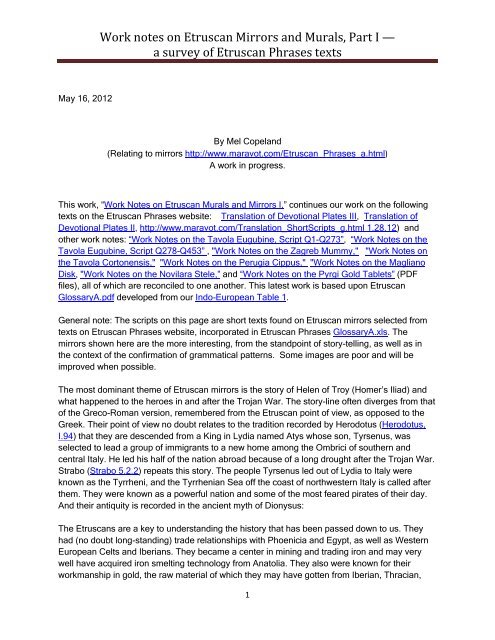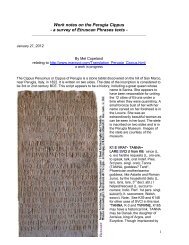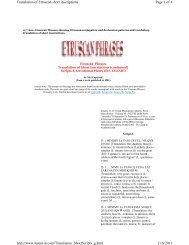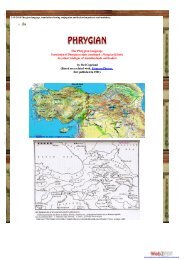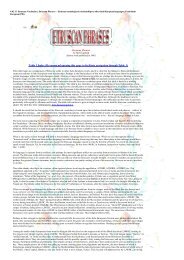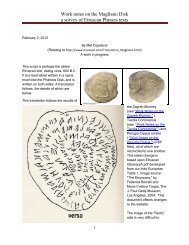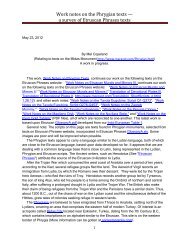Work notes on Etruscan Mirrors and Murals, Part I â - maravot.com
Work notes on Etruscan Mirrors and Murals, Part I â - maravot.com
Work notes on Etruscan Mirrors and Murals, Part I â - maravot.com
- No tags were found...
Create successful ePaper yourself
Turn your PDF publications into a flip-book with our unique Google optimized e-Paper software.
<str<strong>on</strong>g>Work</str<strong>on</strong>g> <str<strong>on</strong>g>notes</str<strong>on</strong>g> <strong>on</strong> <strong>Etruscan</strong> <strong>Mirrors</strong> <strong>and</strong> <strong>Murals</strong>, <strong>Part</strong> I —a survey of <strong>Etruscan</strong> Phrases textsMay 16, 2012By Mel Copel<strong>and</strong>(Relating to mirrors http://www.<strong>maravot</strong>.<strong>com</strong>/<strong>Etruscan</strong>_Phrases_a.html)A work in progress.This work, “<str<strong>on</strong>g>Work</str<strong>on</strong>g> Notes <strong>on</strong> <strong>Etruscan</strong> <strong>Murals</strong> <strong>and</strong> <strong>Mirrors</strong> I,” c<strong>on</strong>tinues our work <strong>on</strong> the followingtexts <strong>on</strong> the <strong>Etruscan</strong> Phrases website: Translati<strong>on</strong> of Devoti<strong>on</strong>al Plates III, Translati<strong>on</strong> ofDevoti<strong>on</strong>al Plates II, http://www.<strong>maravot</strong>.<strong>com</strong>/Translati<strong>on</strong>_ShortScripts_g.html 1.28.12) <strong>and</strong>other work <str<strong>on</strong>g>notes</str<strong>on</strong>g>: “<str<strong>on</strong>g>Work</str<strong>on</strong>g> Notes <strong>on</strong> the Tavola Eugubine, Script Q1-Q273”, “<str<strong>on</strong>g>Work</str<strong>on</strong>g> Notes <strong>on</strong> theTavola Eugubine, Script Q278-Q453” , "<str<strong>on</strong>g>Work</str<strong>on</strong>g> Notes <strong>on</strong> the Zagreb Mummy," "<str<strong>on</strong>g>Work</str<strong>on</strong>g> Notes <strong>on</strong>the Tavola Cort<strong>on</strong>ensis," "<str<strong>on</strong>g>Work</str<strong>on</strong>g> Notes <strong>on</strong> the Perugia Cippus," "<str<strong>on</strong>g>Work</str<strong>on</strong>g> Notes <strong>on</strong> the MaglianoDisk, "<str<strong>on</strong>g>Work</str<strong>on</strong>g> Notes <strong>on</strong> the Novilara Stele,” <strong>and</strong> “<str<strong>on</strong>g>Work</str<strong>on</strong>g> Notes <strong>on</strong> the Pyrgi Gold Tablets” (PDFfiles), all of which are rec<strong>on</strong>ciled to <strong>on</strong>e another. This latest work is based up<strong>on</strong> <strong>Etruscan</strong>GlossaryA.pdf developed from our Indo-European Table 1.General note: The scripts <strong>on</strong> this page are short texts found <strong>on</strong> <strong>Etruscan</strong> mirrors selected fromtexts <strong>on</strong> <strong>Etruscan</strong> Phrases website, incorporated in <strong>Etruscan</strong> Phrases GlossaryA.xls. Themirrors shown here are the more interesting, from the st<strong>and</strong>point of story-telling, as well as inthe c<strong>on</strong>text of the c<strong>on</strong>firmati<strong>on</strong> of grammatical patterns. Some images are poor <strong>and</strong> will beimproved when possible.The most dominant theme of <strong>Etruscan</strong> mirrors is the story of Helen of Troy (Homer’s Iliad) <strong>and</strong>what happened to the heroes in <strong>and</strong> after the Trojan War. The story-line often diverges from thatof the Greco-Roman versi<strong>on</strong>, remembered from the <strong>Etruscan</strong> point of view, as opposed to theGreek. Their point of view no doubt relates to the traditi<strong>on</strong> recorded by Herodotus (Herodotus,I.94) that they are descended from a King in Lydia named Atys whose s<strong>on</strong>, Tyrsenus, wasselected to lead a group of immigrants to a new home am<strong>on</strong>g the Ombrici of southern <strong>and</strong>central Italy. He led his half of the nati<strong>on</strong> abroad because of a l<strong>on</strong>g drought after the Trojan War.Strabo (Strabo 5.2.2) repeats this story. The people Tyrsenus led out of Lydia to Italy wereknown as the Tyrrheni, <strong>and</strong> the Tyrrhenian Sea off the coast of northwestern Italy is called afterthem. They were known as a powerful nati<strong>on</strong> <strong>and</strong> some of the most feared pirates of their day.And their antiquity is recorded in the ancient myth of Di<strong>on</strong>ysus:The <strong>Etruscan</strong>s are a key to underst<strong>and</strong>ing the history that has been passed down to us. Theyhad (no doubt l<strong>on</strong>g-st<strong>and</strong>ing) trade relati<strong>on</strong>ships with Phoenicia <strong>and</strong> Egypt, as well as WesternEuropean Celts <strong>and</strong> Iberians. They became a center in mining <strong>and</strong> trading ir<strong>on</strong> <strong>and</strong> may verywell have acquired ir<strong>on</strong> smelting technology from Anatolia. They also were known for theirworkmanship in gold, the raw material of which they may have gotten from Iberian, Thracian,1
<str<strong>on</strong>g>Work</str<strong>on</strong>g> <str<strong>on</strong>g>notes</str<strong>on</strong>g> <strong>on</strong> <strong>Etruscan</strong> <strong>Mirrors</strong> <strong>and</strong> <strong>Murals</strong>, <strong>Part</strong> I —a survey of <strong>Etruscan</strong> Phrases textsAnatolian (Lydian), British <strong>and</strong> Egyptian resources. They were sea-traders <strong>and</strong> in the story ofDi<strong>on</strong>ysus, whose homel<strong>and</strong> was believed to be Thrace or Phrygia, the <strong>Etruscan</strong>s areremembered as pirates.Apparently a Tyrrhenian ship kidnapped Di<strong>on</strong>ysus <strong>and</strong> his "nurses" from the isl<strong>and</strong> ofIcaria. The sailors began to fight over the youth, since he was quite h<strong>and</strong>some, <strong>and</strong> thecaptain of the ship, Acoetes, did as much as he could to protect the young man.Suddenly in spite of a stiff breeze in its sails, the ship stood still <strong>and</strong> then ivy <strong>and</strong>grapevines began to entangle every<strong>on</strong>e <strong>on</strong> the ship; then wild beasts — panthers, li<strong>on</strong>s<strong>and</strong> bears — suddenly appeared <strong>on</strong> deck. Some say that the captain was eaten by a li<strong>on</strong>.In any event the terrified sailors jumpedoff the ship <strong>and</strong> turned into dolphins. Thedolphins — having <strong>on</strong>ce been humans —thereafter were friendly to human beings.Di<strong>on</strong>ysus placed <strong>on</strong>e of them am<strong>on</strong>g thestars to <strong>com</strong>memorate his triumph <strong>and</strong>,no doubt, as a warning to pirates.Di<strong>on</strong>ysus' travels carried him to manyparts of the world, including India <strong>and</strong>Egypt. Am<strong>on</strong>g his many adventures he issaid to have routed the Amaz<strong>on</strong>s beforeHeracles made his famous expediti<strong>on</strong> totheir country. Di<strong>on</strong>ysus got involved inthe war between the gods <strong>and</strong> theGiants. Led by his braying asses, satyrs,seleni <strong>and</strong> Hephaestus, Di<strong>on</strong>ysusrushed up<strong>on</strong> the Giants, but was turnedback by the m<strong>on</strong>ster Typh<strong>on</strong>, <strong>and</strong> flew toEgypt. He <strong>and</strong> the other gods tookrefuge there disguising themselves asvarious animals. Di<strong>on</strong>ysus took the formof a goat. While he <strong>and</strong> his army orfollowers were in Egypt they were lostFigure 1 Typh<strong>on</strong>, <strong>Etruscan</strong> mural from <strong>Etruscan</strong> Phrases<strong>and</strong> without water in the desert.Some<strong>on</strong>e spied a stray ram <strong>and</strong> followedit. It vanished but <strong>on</strong> the spot where it was they spied a spring. To <strong>com</strong>memorate thisevent, Di<strong>on</strong>ysus established a shrine of the ram-headed god Amm<strong>on</strong> <strong>and</strong> also placed theram in the stars as the c<strong>on</strong>stellati<strong>on</strong> aries. Di<strong>on</strong>ysus <strong>and</strong> his followers returned toOlympus after Zeus had thrown the isl<strong>and</strong> of Sicily <strong>on</strong> top of the m<strong>on</strong>ster Typh<strong>on</strong>, whohad been chasing them.2
<str<strong>on</strong>g>Work</str<strong>on</strong>g> <str<strong>on</strong>g>notes</str<strong>on</strong>g> <strong>on</strong> <strong>Etruscan</strong> <strong>Mirrors</strong> <strong>and</strong> <strong>Murals</strong>, <strong>Part</strong> I —a survey of <strong>Etruscan</strong> Phrases textsThe Greek historian, Ephorus, whom Strabo quoted, reported that when the Greeks foundedtheir first col<strong>on</strong>y, Naxos, in Sicily, they were afraid to penetrate further into the WesternMediterranean (called the Tyrrhenian Sea) for fear of the Tyrrhenians. He wrote this around 735B.C. or earlier.If we were to believe the Iliad, that the Greeks laid siege to Troy for ten l<strong>on</strong>g years, ravaging thefarms in the l<strong>and</strong>, then we can expect a disrupti<strong>on</strong> of farming <strong>and</strong> a drought as seen whereverarmies pass through <strong>and</strong> occupy l<strong>and</strong>s. As for the physical evidence of a drought about the timeof the Trojan War (-1180 B.C.), a PNA study of solar output shows an increase in solar energy atthat time, corresp<strong>on</strong>ding to a period of drought.The people that are involved in the story of the Iliad are mound builders, whose tombs <strong>and</strong>megaliths spread from southeastern Europe into western Anatolia (Phrygia <strong>and</strong> Lydia, Troybeing part of that area) <strong>and</strong> into Western Europe: Italy, the Iberian peninsula, the Atlantic coastof France, Britain <strong>and</strong> Germany. The Phrygians <strong>and</strong> Lydians are noted in the Iliad as allies ofTroy, as well as the Thracians (modern Romania <strong>and</strong> Bulgaria). The tumuli follow similarpractices that can be recalled in the Iliad:In Homer, the story of the Arg<strong>on</strong>auts <strong>and</strong> Ovid's Metamorphosis, the people involved in theTrojan War practiced cremati<strong>on</strong>, as a rule, the raising of burial mounds which could often beused as l<strong>and</strong>marks <strong>and</strong> places for look-out stati<strong>on</strong>s (towers) <strong>and</strong> the holding of games aroundthe mound after the burial. It is also noted in the Iliad, with regard to the raising of the barrow ofPatroclüs, that a turning post around which the chariot racers would turn was a "boundary"which is called a "menhir" today. Also, in the raising of the barrow of Patroclüs the barddescribes exactly what we find in other European barrows: a st<strong>on</strong>e circle marking the perimeterof the tomb, that would hold in the dirt, the placement of st<strong>on</strong>es to form the barrow, <strong>and</strong> thesacrifices, such as a bull, placed <strong>on</strong> the edge of the barrow.The burial of Patroclüs is the oldest descripti<strong>on</strong> that we have of an Indo-European mound burial.So it is worth repeating:Iliad, book XXIII While the Trojans were mooring within their city, the Achaians madetheir way to the ships beside the Hellesp<strong>on</strong>t. Most of them dispersed to their ownvessels, but Achilles would not let the Myrmid<strong>on</strong>s disperse until he had addressed themin these words:"Your horses have d<strong>on</strong>e good service today, my brave <strong>com</strong>rades; but we must notunyoke them yet. Let us go, horses <strong>and</strong> chariots <strong>and</strong> all, to mourn for Patrolcüs, for thatis the h<strong>on</strong>our due to the dead. When we have c<strong>on</strong>soled ourselves with lamentati<strong>on</strong>, letus unharness them <strong>and</strong> take our meal."Then he led the cavalcade three times round the body, all mourning <strong>and</strong> crying aloud;<strong>and</strong> Thetis lamented with them. The s<strong>and</strong>s were drenched with their tears, their armorwas drenched, so much their hearts l<strong>on</strong>ged for that mighty man. And Peleidês led theirlamentati<strong>on</strong>s, as he laid his manslaying h<strong>and</strong>s <strong>on</strong> his true friends' breast:3
<str<strong>on</strong>g>Work</str<strong>on</strong>g> <str<strong>on</strong>g>notes</str<strong>on</strong>g> <strong>on</strong> <strong>Etruscan</strong> <strong>Mirrors</strong> <strong>and</strong> <strong>Murals</strong>, <strong>Part</strong> I —a survey of <strong>Etruscan</strong> Phrases texts"Fare thee well, Patroclüs, even in the house of death! See now I am fulfilling all that Ipromised! I said I would drag Hector to this place <strong>and</strong> give him to the dogs to devour raw;<strong>and</strong> in fr<strong>on</strong>t of your pyre I would cut the throats of twelve noble s<strong>on</strong>s of the Trojans, inpayment for your death."Then he did a vile outrage to royal Hector: he stretched the body <strong>on</strong> its face in the dirtbeside the bier of Menoitiadês.After that all took off their armor, <strong>and</strong> unharnessed the loud-whinnying horses, <strong>and</strong> satdown beside the ship of Achilles in their thous<strong>and</strong>s. There he provided a fine funeralfeast. Many bellowing bulls fell under the knife, many sheep <strong>and</strong> bleating goats; manytusker boars bursting with fat were stretched out to singe over the fire. Around the deadbody the blood of the victims poured out in cupfuls was running all over the ground.Meanwhile Prince Pelei<strong>on</strong> [Achilles] was being led by the Achaean chieftains toAgamemn<strong>on</strong>. They had trouble to persuade him so deep was his sorrow for his <strong>com</strong>rade.At the King's headquarters orders were given to set a cauldr<strong>on</strong> of water over the fire, thathis body might be washed clean of the bloodstains, but he flatly refused <strong>and</strong> swore to it:"No, by Zeus highest <strong>and</strong> greatest of gods! It is not lawful that water may <strong>com</strong>e near myhead, before I lay Patroclüs <strong>on</strong> the fire <strong>and</strong> build him a barrow <strong>and</strong> cut off my hair! For nosec<strong>on</strong>d sorrow like this shall <strong>com</strong>e up<strong>on</strong> me so l<strong>on</strong>g as I am am<strong>on</strong>g the living. Yet for thispresent we must c<strong>on</strong>sent to the meal which we hate. Then tomorrow, my lord KingAgamemn<strong>on</strong>, shall be for bringing firewood <strong>and</strong> providing all that is proper to send thedead down into the dark. The fire shall burn him quickly out of sight, <strong>and</strong> the people shallreturn to their work."They did accordingly: the meal was prepared, <strong>and</strong> all partook <strong>and</strong> found no lack. Whenthey were satisfied, the others retired to rest; but Peleidês lay with many of hisMyrmid<strong>on</strong>s, in the open air <strong>on</strong> the shore of the sounding sea, while the waves washed <strong>on</strong>the beach, lay groaning heavily until sleep fell up<strong>on</strong> him: a deep sweat sleep thatsoothed the sorrows of his heart, for his str<strong>on</strong>g limbs were weary with that l<strong>on</strong>g pursuitafter Hector about the city of Ilios.In sleep came to him the soul of unhappy Patroclüs, his very image in stature <strong>and</strong>wearing clothes like his, with his voice <strong>and</strong> those lovely eyes. The visi<strong>on</strong> stood by hishead <strong>and</strong> spoke:"You sleep, Achilles, <strong>and</strong> you have forgotten me! When I lived you were not careless ofme, but now that I am dead! Bury me without delay, that I may pass the gates of hades.Those phantoms hold me off, the souls of those whose work is d<strong>on</strong>e; they will not sufferme to join them bey<strong>on</strong>d the river, but I w<strong>and</strong>er aimlessly about the broad gates of thehouse of Hades. And give me that h<strong>and</strong>, I pray; for never again shall I <strong>com</strong>e back from4
<str<strong>on</strong>g>Work</str<strong>on</strong>g> <str<strong>on</strong>g>notes</str<strong>on</strong>g> <strong>on</strong> <strong>Etruscan</strong> <strong>Mirrors</strong> <strong>and</strong> <strong>Murals</strong>, <strong>Part</strong> I —a survey of <strong>Etruscan</strong> Phrases textsHades when <strong>on</strong>ce you have given me my porti<strong>on</strong> of fire. Never again in life shall we goapart from our <strong>com</strong>pani<strong>on</strong>s <strong>and</strong> take counsel together; but I am swallowed up already bythat cruel fate which got me <strong>on</strong> the day I was born; <strong>and</strong> you also have your positi<strong>on</strong>, mymagnificent Achilles, to perish before the walls of this great city. One thing more I say,<strong>and</strong> I will put it up<strong>on</strong> you as a charge if you will <strong>com</strong>ply: do not lay my b<strong>on</strong>es apart fromyours, Achilles, but with them, as I was brought up with you in your home, whenMenoitios brought me quite a little <strong>on</strong>e from Opoeis to your house, for manslaughter, theday when I killed Amphidamas' s<strong>on</strong> — I did not mean it, we had a silly quarrel over theknuckle-b<strong>on</strong>es. Then Peleus received me, <strong>and</strong> brought me up kindly in his house, <strong>and</strong>name me as your attendant. Then let <strong>on</strong>e urn cover my b<strong>on</strong>es with yours, that goldentwo-h<strong>and</strong>led urn which your gracious mother gave you."Achilles said in answer:"Why have you <strong>com</strong>e here, beloved <strong>on</strong>e, with all these charges of this <strong>and</strong> that? Ofcourse I will do as you tell me every bit. But <strong>com</strong>e nearer; for <strong>on</strong>e short moment let us layour arms about each other <strong>and</strong> c<strong>on</strong>sole ourselves with lamentati<strong>on</strong>!"He stretched out his arms as he spoke, but he could not touch, for the soul was g<strong>on</strong>e likesmoke into the earth, twittering. Achilles leapt up in amazement <strong>and</strong> clapped his h<strong>and</strong>swith solemn words:"See there now! So there is still something in the house of Hades, a soul <strong>and</strong> a phantombut no real life in it at all! For all night l<strong>on</strong>g the soul of unhappy Patroclüs has been by myside, sorrowing <strong>and</strong> lamenting <strong>and</strong> telling me what to do. And it was mightily likehimself!"All around were moved to lamentati<strong>on</strong> when they heard his words. They were stillmouring when Dawn showed her fingers of light. Then King Agamemn<strong>on</strong> sent out mules<strong>and</strong> men from the whole camp to bring firewood, under the charge of Idomeneus's manMeri<strong>on</strong>ês...Down <strong>on</strong> the shore they laid their logs in order, in the place where Achillesdesigned a great barrow for Patroclüs <strong>and</strong> himself.When the logs were laid in their places, the men sat where they were, all together. ThenAchilles ordered his Myrmid<strong>on</strong>s to d<strong>on</strong> their armor <strong>and</strong> harness their horses; theymounted the cars, both fighting men <strong>and</strong> drives, chariots in fr<strong>on</strong>t, a cloud of footmenbehind, thous<strong>and</strong>s, <strong>and</strong> in the midst was Patroclüs borne by his <strong>com</strong>rades. They had cutoff their hair <strong>and</strong> thrown it over the body like a shroud. Achilles came behind himclasping the head; his own unspotted <strong>com</strong>rade he was escorting to the grave.At the place where Achilles had appointed, they laid him down <strong>and</strong> piled great heaps offirewood. Then Achilles did his part. He stood away from the pile, <strong>and</strong> cut off the goldentress which he had kept uncut am<strong>on</strong>g his thick hair for the river Spercheios, <strong>and</strong> spokedeeply moved as he gazed over the dark sea:5
<str<strong>on</strong>g>Work</str<strong>on</strong>g> <str<strong>on</strong>g>notes</str<strong>on</strong>g> <strong>on</strong> <strong>Etruscan</strong> <strong>Mirrors</strong> <strong>and</strong> <strong>Murals</strong>, <strong>Part</strong> I —a survey of <strong>Etruscan</strong> Phrases texts"O Spercheios! This is not for thee! That vow was vain which Peleus my father made,that when I returned to my native l<strong>and</strong> I would c<strong>on</strong>secrate my hair to thee, <strong>and</strong> makesolemn sacrifice, <strong>and</strong> that he would sacrifice fifty rams without blemish into thy waters, atthe altar which is in thy precinct at the same place. That was my father's vow, but thoudidst not fulfil his hope. Now, therefore, since I am not to return to my native l<strong>and</strong>, I wouldgive the warrior Patroclüs this to carry with him:The he laid the hair in the h<strong>and</strong>s of his well-beloved <strong>com</strong>pani<strong>on</strong>. All present broke intolamentati<strong>on</strong> with all their hearts; <strong>and</strong> they would not have ceased while the sun sh<strong>on</strong>e,but Achilles drew near Agamemn<strong>on</strong> <strong>and</strong> said to him:"Atreidês, you are our lord paramount, <strong>and</strong> it is yours to <strong>com</strong>m<strong>and</strong>. There is plenty oftime for the people to mourn, but just now I ask you to dismiss them from this place <strong>and</strong>tell them to get ready for their meal. All this is the business of those who are nearest akinto the dead; <strong>and</strong> let the chieftains remain with us.Agamemn<strong>on</strong> accordingly dismissed the people, while the mourners remained <strong>and</strong> piledup the wood, <strong>and</strong> made a pyre of a hundred feet each way, <strong>and</strong> up<strong>on</strong> it they laid thebody. They killed flocks of sheep <strong>and</strong> herds of cattle in fr<strong>on</strong>t of the pyre, skinned them<strong>and</strong> cut them up; Achilles took away all the fat, <strong>and</strong> covered the dead with it from head tofoot, <strong>and</strong> heaped the flayed bodies about him. Jars of h<strong>on</strong>ey <strong>and</strong> oil he placed leaningagainst the bier. Four horses he laid carefully <strong>on</strong> the pyre, groaning aloud. Nine dogs theprince had, that fed from his table; two of these Achilles took, <strong>and</strong> cut their throats <strong>and</strong>laid beside him. The twelve noble young Trojans he slew without mercy. Then he appliedthe relentless fire to c<strong>on</strong>sume all, <strong>and</strong> with a groan he called <strong>on</strong> his <strong>com</strong>rades name:"Fare thee well Patroclüs, even in the grave fare thee well! See, I now fulfill all that Ipromised you before. Here are the twelve noble s<strong>on</strong>s of Trojans — the fire is eating themround about you! Hector Priamidês the fire shall not have to eat, but the dogs!"But his threat was vain: no dogs were busy about Hector, for the dogs were driven off bythe daughter of Zeus, Aphrodite herself, by day <strong>and</strong> by night. She washed the skin withrose-oil of ambrosia that it might not be torn by the dragging; <strong>and</strong> Phoibos Apollo drewdown a dark cloud from heaven to earth, <strong>and</strong> covered the place where the body lay, thatthe sun might not scorch the flesh too so<strong>on</strong> over the sinews of his limbs.But the pyre would not burn, <strong>and</strong> Achilles did not know what to do. At last he stood wellaway from the smoldering heap, <strong>and</strong> prayed to North Wind <strong>and</strong> West Wind promisingthem good sacrifices; many a libati<strong>on</strong> he poured from his golden goblet, praying them to<strong>com</strong>e <strong>and</strong> make the wood quickly catch fire, to burn the bodies.Iris heard his prayers, <strong>and</strong> flew quickly to the Winds with her message.6
<str<strong>on</strong>g>Work</str<strong>on</strong>g> <str<strong>on</strong>g>notes</str<strong>on</strong>g> <strong>on</strong> <strong>Etruscan</strong> <strong>Mirrors</strong> <strong>and</strong> <strong>Murals</strong>, <strong>Part</strong> I —a survey of <strong>Etruscan</strong> Phrases textsThey were all in a party at West Wind's, <strong>and</strong> having a fine feast, when in came Iris flying<strong>and</strong> stood <strong>on</strong> the doorst<strong>on</strong>e. As so<strong>on</strong> as they set eyes <strong>on</strong> her, up they all jumped <strong>and</strong>shouted out, every wind of them, "Come <strong>and</strong> sit by me!" But she said:"No thank you, no sitting: I'm bound for the Ocean stream. There is a gr<strong>and</strong> sacrifice inthe Ethiopian country for us immortals, <strong>and</strong> I want to have some too. But Achilles ispraying to North Wind <strong>and</strong> West Wind; he wants them to <strong>com</strong>e <strong>and</strong> promises a goodsacrifice. He wants them to make the pyre burn, where Patorclüs lies with the people allmooring around."Her message given, away she flew, <strong>and</strong> the Winds rose with a devil of a noise <strong>and</strong> drovethe clouds in a riot before them. They swooped up<strong>on</strong> the sea <strong>and</strong> raised the billowsunder their whistling blasts; they reached the Trojan coast <strong>and</strong> fell <strong>on</strong> the pyre till theflames roared again. All night l<strong>on</strong>g they beat up<strong>on</strong> the fire together blowing <strong>and</strong> whistling;all night l<strong>on</strong>g stood Achilles holding his goblet, <strong>and</strong> dipped into the golden mixer, <strong>and</strong>poured the wine <strong>on</strong> the ground, till the place was soaked, calling up<strong>on</strong> the soul ofunhappy Patroclüs. As a father laments while he burns the b<strong>on</strong>es of his own s<strong>on</strong>, newlywedded <strong>and</strong> now dead, to the grief of his bereaved parents, so Achilles lamented as heburnt the b<strong>on</strong>es of Patroclüs, stumbling up <strong>and</strong> down beside the pyre with sobbings <strong>and</strong>groanings.But at the time when the morning star goes forth to tell that light is <strong>com</strong>ing over the earth,<strong>and</strong> after him the saffr<strong>on</strong> mantle of Dawn spreads over the sea, at that hour the flamedied down <strong>and</strong> the burning faded away. Then the Winds returned over the Thracian gulfto their home, while the waters rose <strong>and</strong> roared.And then Achilles moved away from the pyre, <strong>and</strong> sank up<strong>on</strong> the ground tired out: sleepleapt up<strong>on</strong> him <strong>and</strong> gave him peace.Now the people were all gathering round Agamemn<strong>on</strong>. They made such noise <strong>and</strong>uproar that Achilles sat up <strong>and</strong> said:"Atreidês, <strong>and</strong> you other princes, you must first quench the pyre with wine wherever theflames have touched. Then let us gather the b<strong>on</strong>es of Patroclüs Menoitidês, <strong>and</strong> becareful to find the right <strong>on</strong>es. They are easy to know, for he lay right in the middle <strong>and</strong> theothers were <strong>on</strong> the edge, horses <strong>and</strong> men together. His b<strong>on</strong>es we must wrap in a doublelayer of fat <strong>and</strong> lay them in a golden urn, until I myself shall be hidden in Hades. But I d<strong>on</strong>ot wish any great mound to be raised for him, <strong>on</strong>ly just a decent <strong>on</strong>e. Afterwardsanother can be raised both broad <strong>and</strong> high, by those of you who are left behind me."They did his bidding at <strong>on</strong>ce. First they quenched the pyre with wine wherever it hadburnt <strong>and</strong> the ashes were deep; then weeping they gathered the b<strong>on</strong>es of their gentle<strong>com</strong>pani<strong>on</strong>, <strong>and</strong> laid them covered with fat in a golden urn, which they wrapped up in fine7
<str<strong>on</strong>g>Work</str<strong>on</strong>g> <str<strong>on</strong>g>notes</str<strong>on</strong>g> <strong>on</strong> <strong>Etruscan</strong> <strong>Mirrors</strong> <strong>and</strong> <strong>Murals</strong>, <strong>Part</strong> I —a survey of <strong>Etruscan</strong> Phrases textslinen <strong>and</strong> put away safely in the hut. Round the pyre they set up a circle of st<strong>on</strong>e slabs tomark the outside limit, <strong>and</strong> shoveled earth within.The ancient myths, such as you see recorded by Ovid in Metamorphosis, recount how men <strong>and</strong>women <strong>and</strong> gods <strong>and</strong> goddesses changed into animals, trees <strong>and</strong> st<strong>on</strong>es. Even rocks had life,such as the clanging rocks guarding the Hellesp<strong>on</strong>t through which Jas<strong>on</strong> <strong>and</strong> the Arg<strong>on</strong>auts hadto navigate. As a ship would be passing between them, suddenly the rocks would closetogether, crushing the ship <strong>and</strong> all of its passengers. The Iliad's details <strong>on</strong> the barrows <strong>and</strong>traditi<strong>on</strong>s of the Trojans <strong>and</strong> Greeks also refer to the st<strong>on</strong>es as having life to them. One group ofst<strong>on</strong>es menti<strong>on</strong>ed in the Iliad involves a council of the elders who sat up<strong>on</strong> "polished st<strong>on</strong>es."When looking up<strong>on</strong> a st<strong>on</strong>e circle <strong>and</strong> ancient tumuli, picture if you will King Agamemn<strong>on</strong> <strong>and</strong>his allies in council with regard to the c<strong>on</strong>duct of the war against the Trojans, for it may be thatHector's proposal to the Achaeans was in a st<strong>on</strong>e circle. Njal's Saga, a late 13th centurychr<strong>on</strong>icle from Icel<strong>and</strong>, records a similar court before what is called the "Law Rock." Each year aspecial court, called the Althing, was held at the "Law Rock” to judge disputes, divorces etc. Thesaga records a period during which Icel<strong>and</strong>ic family disputes produced many battles <strong>and</strong>revenge-killings. The disputes were resolved at the "Law Rock," in a manner similar to thatrecorded in the Iliad two thous<strong>and</strong> years earlier.Listen to the bard's quote of Hector:Iliad, Book VII: "Hear me speak, Trojans <strong>and</strong> Achaians both, <strong>and</strong> let me tell you what isin my mind. Cr<strong>on</strong>idês thr<strong>on</strong>ed <strong>on</strong> high would not let us keep our sworn treaty; but heordains a hard struggle for us all, until either you shall take the castle of Troy, or youshall be vanquished yourselves beside your own ships. Here am<strong>on</strong>g you if any <strong>on</strong>e ofyou has a mind to fight with me, let him <strong>com</strong>e forth, <strong>and</strong> be your champi<strong>on</strong> againstHector."Here is what I propose, <strong>and</strong> let Zeus be witness <strong>on</strong> both parts: if that man shall strike medown, let him strip me <strong>and</strong> take my armor for his spoil; but my body he shall give back tobe carried home, that my people may give me dead my porti<strong>on</strong> of fire. But if Apollo grantme success, <strong>and</strong> I strike him down, I will strip off his armor <strong>and</strong> take it into sacred Troy,<strong>and</strong> hang it before the temple of Apollo Shootafar; but the body I will give back, that hisfriends may carry it to their camp, to give him funeral <strong>and</strong> build him a barrow beside thebroad Hellesp<strong>on</strong>t. Then men will say in far distant generati<strong>on</strong>s to <strong>com</strong>e, as they sailal<strong>on</strong>g the shore, 'Y<strong>on</strong>der is the barrow of a man dead l<strong>on</strong>g ago, a champi<strong>on</strong> whomfamous Hector slew.' So my fame will never be forgotten."<strong>Etruscan</strong> heroes <strong>and</strong> gods also followed descripti<strong>on</strong>s seen in the Iliad. The Iliad is at least as oldas the <strong>Etruscan</strong> scripts, which date as early as 600 B.C. But its traditi<strong>on</strong> offers an earlier datewhich would be about 1,200 B.C., the time of the domini<strong>on</strong> of Mycenae, before the end of theHittite Empire, circa. 1,180 B.C. The s<strong>on</strong>s of the patriarch, Atreus, who were King Agamemn<strong>on</strong><strong>and</strong> his brother, Prince Menelaus, were c<strong>on</strong>sidered the supreme kings of the Achaeans at that8
<str<strong>on</strong>g>Work</str<strong>on</strong>g> <str<strong>on</strong>g>notes</str<strong>on</strong>g> <strong>on</strong> <strong>Etruscan</strong> <strong>Mirrors</strong> <strong>and</strong> <strong>Murals</strong>, <strong>Part</strong> I —a survey of <strong>Etruscan</strong> Phrases textstime. In chapter XI of the Iliad Menelaüs prepares for battle, putting <strong>on</strong> his armor. Compare hisarmor to that of Prince Serelus, of the Vetul<strong>on</strong>ia tombst<strong>on</strong>e:Atreidês shouted orders to arm, <strong>and</strong> he armed himself. First he buckled <strong>on</strong> his finegreaves with silver anklets. Next he d<strong>on</strong>ned the corselet which Cinyrês had given him asa guest-gift; for the great rumor had <strong>com</strong>e to Cyprus that the fleet was about to sail forTroy, <strong>and</strong> therefore he gave him this gift to please him. There were ten stripes of darkblue enamel up<strong>on</strong> it, twelve of gold, <strong>and</strong> twenty of tin; blue drag<strong>on</strong>s reached up towardsthe neck, three <strong>on</strong> each side, like the rainbow which Cr<strong>on</strong>i<strong>on</strong> sets in the cloud to be aportent for mortal men.Over his shoulder he threw the sword, with shining knobs of solid gold, <strong>and</strong> a silversheath with golden slings.He caught up a brave shield of fine workmanship, covering the body <strong>on</strong> both sides. Tencircles of br<strong>on</strong>ze ran round it, <strong>and</strong> it had twenty bosses of white tin with <strong>on</strong>e of blueenamel in the middle. Up<strong>on</strong> this boss was the grim-faced Gorg<strong>on</strong> glaring horribly, <strong>and</strong> <strong>on</strong>either side Terror <strong>and</strong> Panic. The shield-strap was of silver, <strong>and</strong> a blue drag<strong>on</strong> wastwining up<strong>on</strong> it, with three heads twisted together <strong>and</strong> growing from <strong>on</strong>e neck.Up<strong>on</strong> his head he put a helmet with two horns <strong>and</strong> four bosses <strong>and</strong> a horsehair plume.How terrible was that nodding plume!He took a pair of sharp spears with blades of br<strong>on</strong>ze, which sent their glittering gleamhigh into the air.This is the framework of the <strong>Etruscan</strong> heritage, to be passed down through their tumuli <strong>and</strong>artifacts. <strong>Murals</strong> inside their tombs <strong>and</strong> more particularly their finely-wrought mirrors follow thisTrojan heritage. Their mirrors — though carrying <strong>Etruscan</strong> writing — have been found from theinterior of Gaul to the Black Sea. We begin with the stories <strong>on</strong> the mirrors <strong>and</strong> are indebted to amajor resource <strong>on</strong> <strong>Etruscan</strong> mirrors, Corpus Speculorum Etruscorum, a multivolume work.Copies I examined are in the University of California Library, catalogued in the Pathfinder UCBLibrary Catalogue. (See http://www.<strong>maravot</strong>.<strong>com</strong>/Translati<strong>on</strong>_ShortScripts_f.html for anintroducti<strong>on</strong> to them.) A few years ago <strong>on</strong>e of the c<strong>on</strong>tributors of that work indicated that it was inthe process of being updated.We begin with the beginning of the story <strong>on</strong> the sack of Troy. King Agamemn<strong>on</strong> of Mycenaesought an alliance with the powerful city of Sparta. He proposed that the alliance could beac<strong>com</strong>plished through the marriage of his younger brother, Menelaüs, to the daughter ofSparta’s king Tyndareüs, who was Helen, c<strong>on</strong>sidered then to be the most beautiful woman in theworld. She had two brothers, Polydeuces (Pollux) <strong>and</strong> Castor who were called the Dioscuri,whose c<strong>on</strong>stellati<strong>on</strong> can be seen in the night sky as Gemini.9
<str<strong>on</strong>g>Work</str<strong>on</strong>g> <str<strong>on</strong>g>notes</str<strong>on</strong>g> <strong>on</strong> <strong>Etruscan</strong> <strong>Mirrors</strong> <strong>and</strong> <strong>Murals</strong>, <strong>Part</strong> I —a survey of <strong>Etruscan</strong> Phrases textsThere are several versi<strong>on</strong>s to thestory of the birth of Helen. Themost popular versi<strong>on</strong> has Zeuschasing the daughter of Night(Gr. Nix). Nemesis (meaningrevenge), was a shape-changer<strong>and</strong> was the goddess ofretributi<strong>on</strong> for evil deeds orundeserved good fortune. Shewas the pers<strong>on</strong>ificati<strong>on</strong> of theresentment aroused in men <strong>and</strong>gods by other men who <strong>com</strong>mitcrimes with apparent impunity orhave inordinate good fortune.She fled from Zeus, changed intoa goose, but was caught by himafter he changed into a swan.From their encounter an egg was produced — possibly two eggs, <strong>on</strong>e c<strong>on</strong>taining Helen <strong>and</strong> theother <strong>on</strong>e of the Dioscuri twins. According to the usual versi<strong>on</strong> two eggs were laid, eachproducing two children. Polydeuces (Pollux) <strong>and</strong> Helen, who were the children of Zeus camefrom <strong>on</strong>e egg; from the other came, Castor <strong>and</strong> Clytemnestra who were the children ofTyndareüs. The <strong>Etruscan</strong> mirrors clarify this image, since it is the Dioscuri who present the eggto King Tyndareüs <strong>and</strong> his wife, Queen Leda.(http://www.<strong>maravot</strong>.<strong>com</strong>/Translati<strong>on</strong>_ShortScripts_d.html)Script DADA-1 LATFA CASTVR PVLTVCEI TVRAN Leda, Castor, Pollux or Polydeukes, TuranLATFA – See also CM-1. Note the "ei" suffix in Pollux's name. This suffix is <strong>com</strong>m<strong>on</strong> toHelen of Troy's name, ELINEI in Script MM.DA-5 TVNTLE Tyndareüs TVNTLE – See also CM-2.DA-6 THEI (ΘEI) THRVNEI (Θ RVNEI) ALSV RINA goddess (L. deus, divus, di, divi,dea, diva; It. dio, dia; Fr. dieu, dieux, deese) of the Trojans (L. Troianus-a-um) the cold(L. alsius-a-um)? queen (L. regina-ae; It. regina; Fr. reine)This scene shows Queen Leda <strong>and</strong> King Tyndareüs being presented the egg c<strong>on</strong>taining Helenby Castor <strong>and</strong> his brother Pollux, with Turan <strong>and</strong> another woman observing. There are sixcharacters in the scene, <strong>on</strong>e of which must be a goddess (besides Turan). Turan is probably thefemale next to Tyndareüs, which coincides with the order in the list. Next to Turan must be the10
<str<strong>on</strong>g>Work</str<strong>on</strong>g> <str<strong>on</strong>g>notes</str<strong>on</strong>g> <strong>on</strong> <strong>Etruscan</strong> <strong>Mirrors</strong> <strong>and</strong> <strong>Murals</strong>, <strong>Part</strong> I —a survey of <strong>Etruscan</strong> Phrases textsother goddess: the Trojan goddess. Next to her would be Castor <strong>and</strong> next to him Pollux. Theseated woman who appears somewhat bored or pensive must be Leda.According to popular versi<strong>on</strong>s of the story it was shepherds who found the egg laid by Nemesisthat c<strong>on</strong>tained Helen <strong>and</strong> who presentedthe egg to Leda. In this story Castor ispresenting the egg to Tyndareüs. Thisc<strong>on</strong>tradicts the storyline that Nemesis laidan egg in a grove in Sparta, whereshepherds found the egg <strong>and</strong> took it toLeda, wife of King Tyndareüs. After Helenwas hatched from the egg Leda reared heras her own daughter. In a variati<strong>on</strong> of thetale, Zeus <strong>and</strong> Aphrodite plotted Nemesis’downfall. Aphrodite, in the form of an eagle,pretended to chase the swan Zeus. He tookrefuge in the lap of Nemesis (who retainedher human form in this story, but otherwisewould have changed into some horribleshape or m<strong>on</strong>ster). The goddess wasover<strong>com</strong>e with <strong>com</strong>passi<strong>on</strong> <strong>and</strong> did notchase the bird away but, instead, wentobligingly to sleep. In this versi<strong>on</strong> Nemesis laid an egg that was taken either by a shepherd or byHermes, to Leda. Zeus placed both the swan <strong>and</strong> the eagle in the stars to celebrate his triumph.In the other versi<strong>on</strong> from the <strong>Etruscan</strong>s, Hermes (Etr. TURMS [TVRMS] is presenting the egg toTydareüs. (http://www.<strong>maravot</strong>.<strong>com</strong>/Translati<strong>on</strong>_ShortScripts_f.html)CV — Corpus Bunderepublik Deutchl<strong>and</strong> 4, Staatliche Museen Zu Berlin, Figure 32.b.CV-1 TVRMS HermesCV-2 TVNTLES Tyndareüs He is holding an egg in his h<strong>and</strong> before Hermes. He is alsoseen in CM-2 <strong>and</strong> DA-5, as TVNTLE. Note the declensi<strong>on</strong>. Latin, 5th Decl. Abl. single -e; Nom. singl. -es.The messenger of the gods, Hermes, plays a large role in <strong>Etruscan</strong> mythology, <strong>and</strong> is c<strong>on</strong>nectedwith whisking the souls of the dead away from Hades. Hermes (L. Mercury) is also important tothe Celts, reported by Julius Caesar, “Gallic Wars,” as being <strong>on</strong>e of their most important gods.Helen had been lusted after since a child. Theseus <strong>and</strong> his friend Peirithoüs were eager tomarry daughters of Zeus. They decided to abduct Helen when she was twelve years old, — as11
<str<strong>on</strong>g>Work</str<strong>on</strong>g> <str<strong>on</strong>g>notes</str<strong>on</strong>g> <strong>on</strong> <strong>Etruscan</strong> <strong>Mirrors</strong> <strong>and</strong> <strong>Murals</strong>, <strong>Part</strong> I —a survey of <strong>Etruscan</strong> Phrases textsshe was sacrificing to Artemis — <strong>and</strong> carried her to the city of Aphidnae, in Attica, to be<strong>com</strong>eTheseus’ bride. The Dioscuri waited until Theseus was away <strong>on</strong> another adventure, thencaptured Aphidnae, <strong>and</strong> perhaps Athens as well, with the aid of Spartan <strong>and</strong> Arcadian armies.They rescued Helen, carried off Theseus’ mother, Aethra, <strong>and</strong> Peirithous’ sister Phisadië, <strong>and</strong>placed Theseus’ rival Menestheus <strong>on</strong> the Athenian thr<strong>on</strong>e.Script DM Divine Mirror, mirror fromVulciWhen it came time to marry off hisbrother Menelaüs, King Agamemn<strong>on</strong>decided to strike a bargain with KingTyndareüs, as Tyndareüs hadextended invitati<strong>on</strong>s throughoutGreece to marry off his daughter <strong>and</strong>all of the princes vied for her h<strong>and</strong>,including Idomeneus, who came fromCrete, <strong>and</strong> Odysseus who sent nogifts. However, powerful kingAgamemn<strong>on</strong> already had an edge up<strong>on</strong> the others, since he was married toHelen’s older sister Clytemnestra. Sohe struck the successful bargain withTyndareüs.(http://www.<strong>maravot</strong>.<strong>com</strong>/Divine_Mirror.html)The <strong>Etruscan</strong> versi<strong>on</strong> doesn’t exactlyrecord the same situati<strong>on</strong>. It seemsthat Helen was already seated <strong>on</strong> thethr<strong>on</strong>e of Sparta <strong>and</strong> as queen ofSparta struck the bargain herself.Agamemn<strong>on</strong> presented the pursedirectly to Helen under the approval ofthe gods.Here in Script DM we see <strong>on</strong> the top panel from right to left, the mother of Helen, Nemesis,seated next to Zeus, <strong>and</strong> next to the god are Heracles <strong>and</strong> Aphrodite. Their <strong>Etruscan</strong> names, leftto right are Thalna, Tinia, Hercle <strong>and</strong> Turan. We thought the spelling of “Thalna” was “Ralna,”but discovered that the <strong>Etruscan</strong> spelling of revenge THALIO (ΘALIV) which corresp<strong>on</strong>ds toretaliati<strong>on</strong> (L talio-<strong>on</strong>is). <strong>Etruscan</strong> names often carry the augmentative “na”, “ne,” as in Italian;i.e., RASNA, RASNE, RASNES. See PC-8, <str<strong>on</strong>g>Work</str<strong>on</strong>g> Notes <strong>on</strong> <strong>Etruscan</strong> Devoti<strong>on</strong>al Plates III. Thus,THALNA (ΘALNA) corresp<strong>on</strong>ds to Gr. Nemesis, revenge.Images of gods <strong>and</strong> heroes in classical mythology are often shown with totems with which they12
<str<strong>on</strong>g>Work</str<strong>on</strong>g> <str<strong>on</strong>g>notes</str<strong>on</strong>g> <strong>on</strong> <strong>Etruscan</strong> <strong>Mirrors</strong> <strong>and</strong> <strong>Murals</strong>, <strong>Part</strong> I —a survey of <strong>Etruscan</strong> Phrases textsare associated. Athena is associated with the owl, for instance. Likewise, Nemesis is associatedwith a goose, which is st<strong>and</strong>ing next to Thalna. TINIA is the <strong>Etruscan</strong> supreme god (Gr. Zeus, L.Jupiter). Next to him is the hero HERCLE (Gr. Heracles, L. Hercules) who is holding his sign, aclub. He presents to TINIA a cherub named EP OR (EP VR). We d<strong>on</strong>’t know why Hercle is in thepicture, since he is not menti<strong>on</strong>ed the story involving Helen’s abducti<strong>on</strong> by the Trojan Alex<strong>and</strong>er(Paris). However, a cherub named Eros (L. Cupid), the s<strong>on</strong> of Aphrodite (L. Venus, Etr. Turan)may have had something to do with causing Helen to fall in love with Alex<strong>and</strong>er. The storyinvolving Eros is also somewhat tangled, since Eros was believed to be am<strong>on</strong>g the first godscreated, preceding Aphrodite who was born out of the sea foam near Cyprus, when Uranus wascastrated. Hesiod says that Eros was <strong>on</strong> h<strong>and</strong> to greet her when she emerged from the sea.Also, Heracles <strong>and</strong> Aphrodite were not associated as lovers. She had married the lame fire-godHephaestus, but did not remain faithful to him very l<strong>on</strong>g. She had a protracted affair with Ares (L.Mars, Mavors, Etr. MARIS) <strong>and</strong> had children by him: Eros, Deimus (Fear), Phoebus (Panic) <strong>and</strong>Harm<strong>on</strong>ia. She also had brief affairs with two or three other gods. She repulsed the advances ofHermes until Zeus too pity <strong>on</strong> him <strong>and</strong> sent an eagle to snatch her s<strong>and</strong>al <strong>and</strong> carry it to him.The goddess had to submit to him in order to recover it. She bore Hermaphroditus, whose namewas <strong>com</strong>pounded of the names of his parents. The amorous god Priapus was reputed to be as<strong>on</strong> of Aphrodite by Di<strong>on</strong>ysus <strong>and</strong> Poseid<strong>on</strong> was said to be the father of Aphrodite’s s<strong>on</strong> Eryx,king of the regi<strong>on</strong> of western Sicily that was named for him, but others say Butes was the father.The sec<strong>on</strong>d panel of the Divine Mirror is more <strong>com</strong>plicated. From right to left we see an angelicbeing, LASA THIMRAE (ΘIMOAE). LASA THIMRAE is probably the Lasa of the ThimbraeanApollo. She recalls Cass<strong>and</strong>ra, who Propertius, in his Elegies, describes as amaenad. Cass<strong>and</strong>ra got her prophetic powers when sleeping in Apollo’s Thimbraean temple.The household goddess carries a w<strong>and</strong> of prophesy in her right h<strong>and</strong> <strong>and</strong> in the left h<strong>and</strong> whatappears to be an alabaster unguent bottle, seen frequently being carried in ladies' h<strong>and</strong>s in<strong>Etruscan</strong> murals. While we see Lasa Thimrae exiting <strong>on</strong> the right, <strong>on</strong> the left h<strong>and</strong> side of thepanel is an alarmed man with a Phrygian hat holding up his h<strong>and</strong> as in protest. His name isAECAI. Note the suffix, “ai,” in both AECAI <strong>and</strong> HELENAI. Helen's name is spelled HELENEIin Script MM). Aecai, here, is probably the s<strong>on</strong> of King Priam of Troy who prophesied that Pariswould bring destructi<strong>on</strong> to Troy. His name was Aesacus, s<strong>on</strong> of Priam by Arisbe. There is aninteresting refrain from the work, "Alex<strong>and</strong>ra," by Lycophr<strong>on</strong> of Calchis (3rd century B.C.) thatrefers to the firebr<strong>and</strong> up<strong>on</strong> Troy voiced through Aesacus:Alex<strong>and</strong>ra (31) "...I see thee hapless city, fired a sec<strong>on</strong>d time by Aeaceian h<strong>and</strong>s..."We can <strong>com</strong>pare this passage to others from the same work:Alex<strong>and</strong>ra (219) "...And would that my father had not spurned the nightly terrors of theoracle of Aesacus...""...wherein <strong>on</strong>e day hereafter the Tymphaean drag<strong>on</strong>, even the king of the Aethices,shall at a feast destroy Heracles sprung from the seed of Aeacus <strong>and</strong> Perseus <strong>and</strong> nostranger to the blood of Temenus..."13
<str<strong>on</strong>g>Work</str<strong>on</strong>g> <str<strong>on</strong>g>notes</str<strong>on</strong>g> <strong>on</strong> <strong>Etruscan</strong> <strong>Mirrors</strong> <strong>and</strong> <strong>Murals</strong>, <strong>Part</strong> I —a survey of <strong>Etruscan</strong> Phrases textsNext to Lasa Thimrae is King Agamemn<strong>on</strong> (Etr. ACHMEMNVN) who is shaking the h<strong>and</strong> ofQueen Helen. (ELINAI). Between them is Menelaüs who appears to be holding a spear in his lefth<strong>and</strong> <strong>and</strong> touching the hair of Helen with his right h<strong>and</strong>. Helen’s h<strong>and</strong> holding a bowl reachesacross the chest of Menelaüs. The presentati<strong>on</strong> of a bowl <strong>and</strong> egg is prominent in <strong>Etruscan</strong>funeral scenes <strong>and</strong> perhaps this scene suggests an eternal b<strong>on</strong>d, as an egg <strong>and</strong> a bowl offeringpromise eternal life to those in <strong>Etruscan</strong> tombs.To Helen’s right are two important characters in the story. The first is a naked youth draped incelestial attire, as in the case of Helen <strong>and</strong> Agamemn<strong>on</strong>, whose name is MENLE (Menelaüs).He is being crowned by an angelic being named MEAN. She has her sign next to her which is adeer. This is the sign of Artemis, the virgin huntress; however, Artemis is featured abundantly inthe <strong>Etruscan</strong> mirrors, so MEAN must be another virgin huntress.MEAN (Latin Maenaas-idis [f], a bacchante, a prophetess) is probably Artemis (the Romanscalled her Diana). Homer (Iliad ii. ; v. 43, xi. 431) refers to the inhabitants of Lydiaas Mai<strong>on</strong>es (Μαίονες). Homer describes their capital not as Sardis butas Hyde (Iliad xx. )[See wikipedia.org <strong>and</strong> www.<strong>maravot</strong>.<strong>com</strong>/Lydian.html].Based up<strong>on</strong> this mirror we may w<strong>on</strong>der how this Trojan Diana / Artemis came to be called Mean,recognizing that the great temple of Ephesian Artemis was nearby. We note that the EphesianArtemis was sculpted as a woman with many breasts, who would certainly not c<strong>on</strong>note a "virginhuntress," but rather the opposite, a mother goddess. However, Diodorus Siculus says:Diodorus: EILEITHYIA, ARTEMIS & THE HOURS[5.73.4] Eileithyia received care of expectant mothers <strong>and</strong> the alleviati<strong>on</strong> of the travail ofchildbirth; <strong>and</strong> for this reas<strong>on</strong> women when they are in perils of this nature call first of allup<strong>on</strong> this goddess.[5.73.5] And Artemis, we are told, discovered how to effect the healing of young children<strong>and</strong> the foods which are suitable to the nature of babes, this being the reas<strong>on</strong> why she isalso called Kourotrophos.Of interest is the fact that in the story of the Arg<strong>on</strong>auts <strong>and</strong> Iphiginia, daughter of Agamemn<strong>on</strong>,Iphiginia is supposed to be sacrificed to Artemis for Agamemn<strong>on</strong>'s boasting. At the last minute adeer nearby was sacrificed up<strong>on</strong> the altar in lieu of Iphiginia, <strong>and</strong> the girl was whisked off to theTaurians al<strong>on</strong>g the Hellesp<strong>on</strong>t where she served as high priest of Artemis. It was a practice bythe king of the Taurians to sacrifice foreigners in the temple of Artemis, <strong>and</strong> when Jas<strong>on</strong> <strong>and</strong> theArg<strong>on</strong>auts arrived <strong>on</strong> the king's coast, Iphiginia helped them escape the sacrificial fire.Diodorus Siculus provides another clue to the identity of MEAN <strong>and</strong> her act of crowningAlex<strong>and</strong>er, as he says that Helen crowned Menelaus:Diodorus: [78] LXXVIII. TYNDAREUSTyndareus, s<strong>on</strong> of Oebalus, by Leda, daughter of Thestius, became father of14
<str<strong>on</strong>g>Work</str<strong>on</strong>g> <str<strong>on</strong>g>notes</str<strong>on</strong>g> <strong>on</strong> <strong>Etruscan</strong> <strong>Mirrors</strong> <strong>and</strong> <strong>Murals</strong>, <strong>Part</strong> I —a survey of <strong>Etruscan</strong> Phrases textsClytemnestra <strong>and</strong> Helen; he gave Clytemnestra in marriage to Agamemn<strong>on</strong>, s<strong>on</strong> ofAtreus. Because of her exceeding beauty many suitors from many states sought Helenin marriage. Tyndareus, since he feared that Agamemn<strong>on</strong> might divorce his daughterClytemnestra, <strong>and</strong> that discord might arise from this, at the advice of Ulysses boundhimself by an oath, <strong>and</strong> gave Helen leave to put a wreath <strong>on</strong> whomever she wished tomarry. She put it <strong>on</strong> Menelaus, <strong>and</strong> Tyndareus gave her to him in marriage <strong>and</strong> at hisdeath left him his kingdom.MEAN <strong>and</strong> LASA THIMRAE represent an early <strong>Etruscan</strong> versi<strong>on</strong> of the Trojan War, <strong>and</strong> it isinteresting that this Divine Mirror shows Artemis placing the laurel wreath <strong>on</strong> Alex<strong>and</strong>er's headwhile Helen is shaking h<strong>and</strong>s with Agamemn<strong>on</strong>, giving her h<strong>and</strong> in marriage to Menelaus.Alex<strong>and</strong>er’s name is spelled ELCHINTRE in this text. He appears in several mirrors, with somevariance in spelling.In mirror CZ MEAN is seen crowning HERCLE in the presence of Larentia (LEINTH). Larentiawho is an obscure Roman goddess worshipped in an annual festival, the Larentalia. She is saidto have been the wife of Faustulus, the shepherd who reared Romulus <strong>and</strong> Remus. She wasalso believed to have been the "she-wolf" that suckled the children — lupa, carrying a doublemeaning, of a she-wolf <strong>and</strong> a prostitute.Larentia is c<strong>on</strong>nected with another storyinvolving Heracle's temple at Rome, where thekeeper had invited Heracles to a c<strong>on</strong>test withdice, with the loser to give the winner a present.When the god w<strong>on</strong>, the temple servant lockedin the sanctuary, al<strong>on</strong>g with a sumptuousdinner, Larentia, the most beautiful prostitute inRome. The god, after taking his fill, advisedLarentia to court the next man she met. She didso <strong>and</strong> became the wife of a wealthy <strong>Etruscan</strong>who bequeathed to her all of his m<strong>on</strong>ey. Thism<strong>on</strong>ey Larentia left in turn to the Romanpeople. In another mirror, CU, MEAN is seated <strong>on</strong> a thr<strong>on</strong>e with Ad<strong>on</strong>is (Etr. ATVNIS) st<strong>and</strong>ingnext to her. Seated to his right is another woman holding a tambourine <strong>and</strong> is probably aBacchante who is here named EUAN (EFAN).On the bottom panel is another angel called LASA RACON (RACVN). RAK, RAKaR is afrequently used verb meaning to recount, speak, talk (It. racc<strong>on</strong>tare; Fr. rac<strong>on</strong>ter; Belarus,raicca; Toch. rake) <strong>and</strong> Lasa Rac<strong>on</strong> may be the angel of narratives, like a muse.Now that we have seen the essential marriage arrangement we can explore how it got to thispoint. The story begins with the wedding of Thetis (THETIS) the mother of the Greek Trojan Warhero Achilles. Thetis was the daughter of the sea god Nereus <strong>and</strong> Doris. It was the wife of Zeus,Hera, who raised Thetis the Nereid, <strong>and</strong> Thetis refused the advances of Zeus because of her15
<str<strong>on</strong>g>Work</str<strong>on</strong>g> <str<strong>on</strong>g>notes</str<strong>on</strong>g> <strong>on</strong> <strong>Etruscan</strong> <strong>Mirrors</strong> <strong>and</strong> <strong>Murals</strong>, <strong>Part</strong> I —a survey of <strong>Etruscan</strong> Phrases textsloyalty to Hera. Zeus angrily forcedher to marry a mortal, but a betterknown versi<strong>on</strong> of this story says thatPrometheus <strong>and</strong> Themis warnedZeus that any s<strong>on</strong> of Thetis wouldsurpass his father or, morespecifically, that if Zeus had a s<strong>on</strong> byThetis, he would <strong>on</strong>e day rule inOlympus. The gods thus quicklyarranged to marry her to a mortal.Script CR — Corpus USA 4: N. E.Collecti<strong>on</strong>s, Providence Rhode Isl<strong>and</strong>,Rhode Isl<strong>and</strong> School of DesignMuseum, figure 38a, said to be fromthe tomb of M<strong>on</strong>te Torello, Fidenae. A copy of the mirror is in the British Museum.CR-1 THETHIS (ΘEΘIS) ThetisCR-2 PELEThis mirror shows Peleus, who was c<strong>on</strong>sidered the worthiest man of his time carrying off Thetis.Some say, however, that he had to win her by force. Like many other deities of the sea, Thetiscould change her shape, but Peleus held her through several alarming transformati<strong>on</strong> <strong>and</strong> finallyw<strong>on</strong> her.Peleus, the husb<strong>and</strong> of Thetis, was the father of Achilles. He was the s<strong>on</strong> of Aeacus, king ofAegina, <strong>and</strong> Endeis. He <strong>and</strong> his brother, Telam<strong>on</strong>, plotted to kill their half-brother, Phocus, eitherbecause he excelled them in sports or merely to please their mother. One brother or the othermurdered Phocus with a st<strong>on</strong>e quoit during a c<strong>on</strong>test, <strong>and</strong> together they hid his body. Aeacuslearned of the crime <strong>and</strong> banished both. Telam<strong>on</strong> settled in the nearby isl<strong>and</strong> of Salamis, butPeleus w<strong>and</strong>ered with his followers <strong>and</strong> flocks as far as Phthia. There King Euryti<strong>on</strong>, or hisfather, Actor, purified him of murder <strong>and</strong> gave him his daughter, Antig<strong>on</strong>e, in marriage. Antig<strong>on</strong>ebore a daughter, P<strong>and</strong>ora. According to Ovid, Peleus went from Aegina to Trachis, where Ceyx,king of Oeta, entertained him. Psamathe, Phocus' sea-nymph mother, sent a wolf to destroyPeleus' flocks. The fugitive tried vainly to appease her with prayers <strong>and</strong> sacrifice. Finally,Psamathe's sister Thetis, who later married Peleus, interceded for him <strong>and</strong> Psamathe turned thewolf to st<strong>on</strong>e.During the Calyd<strong>on</strong>ian boar hunt Peleus accidentally killed his father-in-law, Euryti<strong>on</strong>, <strong>and</strong> didnot dare return to Phthia. He w<strong>and</strong>ered to Iolcus where he stayed with King Acastus, butAcastus' wife, Astydameia or Hippolyte, fell in love with him. He repulsed her, so she sent wordto Antig<strong>on</strong>e that Peleus was about to marry her daughter, Sterope. Antig<strong>on</strong>e killed herself from16
<str<strong>on</strong>g>Work</str<strong>on</strong>g> <str<strong>on</strong>g>notes</str<strong>on</strong>g> <strong>on</strong> <strong>Etruscan</strong> <strong>Mirrors</strong> <strong>and</strong> <strong>Murals</strong>, <strong>Part</strong> I —a survey of <strong>Etruscan</strong> Phrases textsgrief.In further revenge Acastus tried to kill Peleus while hunting <strong>on</strong> Mount Peli<strong>on</strong>, where wild tribes ofCentaurs roamed. The king of the Centaurs, the wise Cheir<strong>on</strong>, found him exposed <strong>and</strong> savedhim. Later Peleus returned to Phthia from his year in exile <strong>and</strong> became king.Zeus had in the meantime been pursuing his phil<strong>and</strong>ering habits <strong>and</strong> was chasing Thetis, <strong>and</strong>this angered Hera. Zeus had been warned, however, that Thetis was fated to bear a child whowould be greater than his father. For <strong>on</strong>e reas<strong>on</strong> or another Zeus <strong>and</strong> Hera decided to marry offThetis. They decided up<strong>on</strong> a mortal <strong>and</strong>, through either Cheir<strong>on</strong> or Proteus, the Old Man of theSea, they let Peleus know that he could capture her in a sea-cave <strong>on</strong> the Magnesian coast. Shewould change forms when he touches her, so he was told to hold her down while she slept.Thetis, captured in her sleep, became successively fire, water, a li<strong>on</strong>ess <strong>and</strong> a tree, but finallysuccumbed to Peleus' persistence <strong>and</strong> c<strong>on</strong>sented to be<strong>com</strong>e his wife. The wedding was held <strong>on</strong>Mount Peli<strong>on</strong> <strong>and</strong> all of the gods were invited except Eris, the goddess of discord.The two lived happily together in Phthia, unwary of the fate held in store for them. When shebore Achilles, to prove the child would be mortal, she exposed him to fire by night <strong>and</strong> ambrosiaby day. Other accounts say that she dipped Achilles in boiling water, <strong>and</strong> then when she dippedhim in the river Styx every part of his body was immortalized except the part by which she heldhim: his heel. Peleus stumbled up<strong>on</strong> her exposing the child to hot coals <strong>and</strong> became enraged.She thereup<strong>on</strong> returned to the sea <strong>and</strong> the child was sent to Cheir<strong>on</strong> for rearing.The other account says that Thetis <strong>and</strong> Peleus c<strong>on</strong>tinued in marriage <strong>and</strong> Thetis knew thatAchilles would die in the Trojan War, so she thus had him raised in the disguise of a girl.The scene of this mirror shows Peleus abducting Thetis. Another mirror, Script DP-3, shows17
<str<strong>on</strong>g>Work</str<strong>on</strong>g> <str<strong>on</strong>g>notes</str<strong>on</strong>g> <strong>on</strong> <strong>Etruscan</strong> <strong>Mirrors</strong> <strong>and</strong> <strong>Murals</strong>, <strong>Part</strong> I —a survey of <strong>Etruscan</strong> Phrases textsPeleus (Peli<strong>on</strong>) receiving Achilles <strong>and</strong> Ajax, either before they died or afterwards.There was a problem at the much celebrated wedding of Thetis <strong>and</strong> Peleus <strong>on</strong> Mt. Peli<strong>on</strong>. All ofthe gods <strong>and</strong> mortals except the goddess of discord, Eris enthusiastically attended the wedding,but Zeus avoiding inviting Eris, the goddess of discord, whom no <strong>on</strong>e liked. Eris came anyway,bearing a golden apple inscribed “For the Fairest.” The divine rivalries that were provoked bythis device would lead, after the famous judgment of Paris, to the Trojan War would be killed,am<strong>on</strong>g many other young Greeks, Achilles, the s<strong>on</strong> of the happy couple whose marriage wasbeing celebrated. Not knowing thefate ahead, the couple livedhappily, except for Thetis’ practiceof putting their <strong>on</strong>ly child, Achilles,in fire by night <strong>and</strong> anointing himwith ambrosia by day, hoping tomake him immortal. Peleus cameup<strong>on</strong> Thetis as she was placing thechild <strong>on</strong>to the coals <strong>and</strong> gave anindignant cry. She was so enragedshe left her husb<strong>and</strong> forever <strong>and</strong>returned to the sea. Occasi<strong>on</strong>allyshe would help him in his affairs,however, <strong>and</strong> supported her s<strong>on</strong> inthe war, providing an unusual setof armor crafted by Hephaestus.18The Judgment of ParisIn the meantime the goddessessought some<strong>on</strong>e to judge who wasthe fairest, to be awarded thegolden apple, whether it was Hera,Athena or Aphrodite. They chosethe h<strong>and</strong>somest youth of the day,Alex<strong>and</strong>er (Paris) s<strong>on</strong> of KingPriam of Troy. The young man waskeeping his flocks <strong>on</strong> Mount Idawhen Hermes appeared (<strong>and</strong> some say Apollo as well) leading the three goddesses. Hermesexplained the situati<strong>on</strong>.Not seeking an unbiased opini<strong>on</strong>, the three goddesses began offering bribes to Alex<strong>and</strong>er. Herapromised to make him ruler of the world if he would award her the apple. Athena vowed that hewould always be victorious in war <strong>and</strong> Aphrodite, as goddess of love, offered him marriage tothe most beautiful woman in the world: Helen, daughter of King Tyndareüs of Sparta. Alex<strong>and</strong>erdid not hesitate in the slightest, ruling that Aphrodite was the fairest.
<str<strong>on</strong>g>Work</str<strong>on</strong>g> <str<strong>on</strong>g>notes</str<strong>on</strong>g> <strong>on</strong> <strong>Etruscan</strong> <strong>Mirrors</strong> <strong>and</strong> <strong>Murals</strong>, <strong>Part</strong> I —a survey of <strong>Etruscan</strong> Phrases textsScript MG - Judgment of Paris before Rhaea" 4th c. B.C. Bloomingt<strong>on</strong>, Indiana UniversityArt Museum (Image: "The <strong>Etruscan</strong>s," Federica Borrelli <strong>and</strong> Maria Cristina Targia, The J.Paul Getty Museum, 2004)MG-1 AL RAIA? a goddess, probably the Titaness Rhea or Rheia (L. Ops), mother ofZeus, Hera <strong>and</strong> Tethys. Here the text would thus read: to her, it (It. al) Rheia. Rheia wasalso identified with the Phrygian goddess, Cybele. The key to the scene should be in theword, FILAE, L. filia-ae, daughter(s). We know that Hera (VNI, Juno) was the daughter ofRheia. Athena (Minerva) was born to Zeus by Zeus' first wife, the Oceanid Metis, asfollows: Zeus was warned by Ge <strong>and</strong> Uranus that if Metis bore a sec<strong>on</strong>d s<strong>on</strong> he wouldrule over heaven. Zeus, who had overthrown his own father <strong>and</strong> did not want to suffer asimilar fate, circumvented this threat by swallowing Metis. As Metis' time for deliverydrew near, Zeus began to have sec<strong>on</strong>d thoughts about his predicament <strong>and</strong> soughteither the Titan Prometheus or craftsman-god Hephaestus to extricate him from hispredicament. One or the other solved the problem by striking Zeus <strong>on</strong> the head with anaxe. Out popped Athena in full armor from his head.MG-2 UNI (VNI) - the goddess Uni, (L. Juno, Gr. Hera) wife of Tinia (L. Jupiter; Gr. Zeus)MG-3 MENRFA - Minerva, goddess of wisdom <strong>and</strong> patr<strong>on</strong>ess of arts <strong>and</strong> sciences (L.Minerva-ae; Gr. Athena)MG-4 ELCINTRE (Alex<strong>and</strong>er) - Note: See Script DM, Divine Mirror.html for the spellingof Alex<strong>and</strong>er's name as ELKINTRE.MG-5 TVRAN - Turan, goddess of love (L. Venus ; Gr. Aphrodite)MG-6 FILAE - daughters (L. filia-ae)Here again is a twist to the tale of Helen of Troy. If Rhea is Cybele then we may be looking at anappeal. Hera, the wife of Zeus, could not judge, but Alex<strong>and</strong>er’s decisi<strong>on</strong> could have beenappealed to Rhea. In any event, it so happens that Queen Helen <strong>and</strong> King Menelaüs were livinghappily in Sparta <strong>and</strong> invited Alex<strong>and</strong>er over for a visit, which he gladly accepted. He stayedwith them for some time <strong>and</strong> suddenly Menelaüs was called to Crete to attend the funeral of hisgr<strong>and</strong>father, leaving Prince Alex<strong>and</strong>er of Troy <strong>and</strong> Queen Helen of Sparta al<strong>on</strong>e. SomehowHelen fell in love with Alex<strong>and</strong>er <strong>and</strong> he whisked her <strong>and</strong> treasures from the Spartan palace offto Troy. The Script DM suggests that Eros (L. Cupid) must have had a h<strong>and</strong> in it, perhapsdelivering a magic poti<strong>on</strong> to Helen.19
<str<strong>on</strong>g>Work</str<strong>on</strong>g> <str<strong>on</strong>g>notes</str<strong>on</strong>g> <strong>on</strong> <strong>Etruscan</strong> <strong>Mirrors</strong> <strong>and</strong> <strong>Murals</strong>, <strong>Part</strong> I —a survey of <strong>Etruscan</strong> Phrases textsThere is evidence that the<strong>Etruscan</strong>s had even morefacts to this story thanthose passed down to us.In mirror MR we seeThetis being approachedby Heracles, Athena <strong>and</strong>Eris. We may w<strong>on</strong>derwhat that c<strong>on</strong>versati<strong>on</strong> isabout, since Heracles isnot in the story passeddown to us in the c<strong>on</strong>textof the marriage of Peleus<strong>and</strong> Thetis <strong>and</strong> the“Golden Apple.”Script MR - <strong>Etruscan</strong>mirror in the MuséeRoyale de Mariem<strong>on</strong>t,Belgium (Imagefrom http://bcs.fltr.ucl.ac.be/FE/02/Miroirs.html). Thenames <strong>on</strong> the mirror arethe following:MR-1 HERCLE (Hercules) - Hercules, Heracles is a popular character <strong>on</strong> <strong>Etruscan</strong><strong>Mirrors</strong>, found in the Divine_Mirror.html Script DM, <strong>and</strong> the Volterra mirror, Uni SucklingHeracles.html, Script AH.MR-2 MENRFA - Minerva, goddess of wisdom <strong>and</strong> patr<strong>on</strong>ess of arts <strong>and</strong> sceinces (L.Minerva-ae; Gr. Athena). She appears <strong>on</strong> several mirrors <strong>and</strong> perhaps <strong>on</strong> the MaglianoDisk, Script M13. There are variant spellings of her name: MANRIFA, M13, MANFRA?,Mirror #696, British Museum, <strong>and</strong> the Oberlin University Museum, _ _NRFA, Script OB-1 (See the Divine_Mirror.html; Script OB, <strong>Etruscan</strong> (Corneto or Tarquinia) H<strong>and</strong> Mirrorwith the Judgment of Paris, ca. 300 - 150 B.C. Oberlin University, Allen Memorial ArtMuseum.20
<str<strong>on</strong>g>Work</str<strong>on</strong>g> <str<strong>on</strong>g>notes</str<strong>on</strong>g> <strong>on</strong> <strong>Etruscan</strong> <strong>Mirrors</strong> <strong>and</strong> <strong>Murals</strong>, <strong>Part</strong> I —a survey of <strong>Etruscan</strong> Phrases textsMR-3 ERIS - Eris is the Greek goddess of discord <strong>and</strong> strife (L. Discordia-ae). Note theGreek spelling of her name <strong>on</strong> this mirror. This mirror is believed to be of three Greekgoddesses, Eris, Athena (L. Minerva) <strong>and</strong> Thetis, the Neried (sea nymph) impregnatedby Zeus, mother of the hero Achilles. The spelling of Thetis <strong>on</strong> this mirror is unusual.MR-4 THETHIS (ΘEΘIS) –ThetisThe next scene in the tragedy of the Trojan War involves the reluctant Achilles who refuses toenter the war. He had been provided w<strong>on</strong>derful armor by his mother Thetis, fashi<strong>on</strong>ed byHephaestus, <strong>and</strong> now sat brooding. Agamemn<strong>on</strong> had taken the Trojan captive Briseïs from him.During his attack <strong>on</strong> Lyrnessus, Achilles killed the s<strong>on</strong>s of King Evenus <strong>and</strong> carried off hisbeautiful daughter as his c<strong>on</strong>cubine. Sometime later Agamemn<strong>on</strong> was forced by the insistenceof Achilles <strong>and</strong> the other leaders to give up his own c<strong>on</strong>cubine, Chrysis, to save the Greeks fromplague. Enraged he took Briseïs from Achilles. Achilles surrendered her but refused to fight anyl<strong>on</strong>ger or to allow his troops to do so. His mother appealed to Zeus to give the Trojans victory sothat the Greeks should be forced to heap h<strong>on</strong>ors <strong>on</strong> Achilles in order to win his help. Zeusc<strong>on</strong>sented. As a result, the Greeks were gradually beaten back to their ships in an assault led byHector.Agamemn<strong>on</strong> sent old Phoenix, together with Odysseus <strong>and</strong> Ajax, to offer not <strong>on</strong>ly Briseïs but agreat deal of treasure as well if Achilles would rejoin the fighting. Achilles refused, <strong>and</strong> keptPhoenix with him. Shortly thereafter Patroclüs, seeing the Trojans threatening to burn the Greekships, begged to be allowed to wear Achilles’ armor into battle. Achilles c<strong>on</strong>sented. Patroclüs,after distinguishing himself in a spectacular manner, was killed by Hector.Script CG — Bunderrepublik Deutchl<strong>and</strong>4, Staatliche Museen Zu Berlin,Antikensammlung 2, 1995, HirmerVerlag, Munchen.CG-1 ACHLE (A LE) Achilles - Namealso seen in Script MM-2, CH-2. Thename is <strong>on</strong> the shield <strong>and</strong> this must beAchilles who seems to be beingsupplicated by Agamemn<strong>on</strong> to join thebattle at Troy.CG-2 FELRE? Note: The word FELRA<strong>and</strong> FELRE appears in Scripts TC <strong>and</strong>Z.CG-3 ACHMEMNVN - Agamemn<strong>on</strong>21
<str<strong>on</strong>g>Work</str<strong>on</strong>g> <str<strong>on</strong>g>notes</str<strong>on</strong>g> <strong>on</strong> <strong>Etruscan</strong> <strong>Mirrors</strong> <strong>and</strong> <strong>Murals</strong>, <strong>Part</strong> I —a survey of <strong>Etruscan</strong> Phrases textsAgamemn<strong>on</strong> appears in theDivine_Mirror.html, Script DM. Phoenix <strong>and</strong> Odysseus were the<strong>on</strong>es that were in the embassy to persuade him to join the battle.Our source <strong>on</strong> Mythology is the Meridian h<strong>and</strong>book of Classical Mythology, by Edward Tripp,New American Library 1970.Launched: 05.11.12Updated: 05.16.12Copyright © 1981-2012 Mel Copel<strong>and</strong>. All rights reserved.Φ —22


